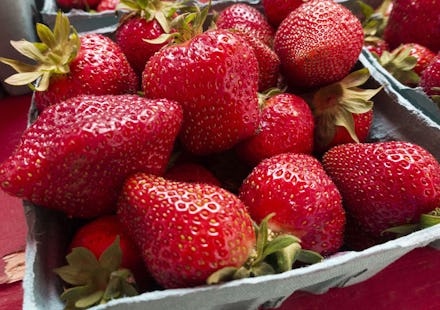The Dirty Dozen 2017: The fruits and veggies with the most pesticides

On Wednesday, the Environmental Working Group released its latest "Dirty Dozen" list. The list reveals the fruits and vegetables that have the highest amount of pesticide residue.
Not all fruits and vegetables are equal when it comes to pesticides, the EWG reported. Some produce like avocados, corn and mangoes have peels or husks that shield produce flesh from pesticides.
But other fruits and vegetables don't have a protective layer. Fruits like strawberries "will always have a lot of pesticides residue because it has no protective outer peel and grows directly on the ground," Sonya Lunder, EWG senior analyst, said in an email. Lunder noted that spinach jumped from slot eight to slot two this year because the EWG observed "relatively high concentrations of some new fungicides, as well an insecticide permethrin" on spinach samples.
By aggregating and analyzing data from the USDA, the EWG determined that the following 12 produce items contain the most pesticide residue.
The Dirty Dozen
1. Strawberries
What are the dangers of consuming produce with pesticide residue?
The pesticide issue is far from black and white — pesticides can be both useful and dangerous. They're essential for farmers to protest crops from, well, pests, and they help farmers ensure their crops don't get decimated by insects, fungi, mold or other threats.
Many pesticide experts note that the dose affects the toxicity: In small doses, the pesticides might be harmless, but if they accumulate in humans, there could be health consequences. One study found that living near areas treated with pesticides stunted neurodevelopment in infants.
"The pro-pesticide folks claim that those levels are safe, but more and more evidences have provided a very different outcome," Chensheng Lu, associate professor of exposure biology at the Harvard T.H. Chan School of Public Health, previously told Mic. Lu explained that scientists don't know the long term effects of eating food with pesticides on a daily basis. "This is a multiple millions research question," he said.
Does eating organic mean you can avoid pesticides entirely?
No matter how much money you spend on a bounty of organic produce, you can't cut out pesticides completely. Organic farmers use natural pesticides made from natural sources. Meanwhile, pesticides used in conventional farming are derived from synthetic sources.
There are advantages and disadvantages to conventional and organic farming. "I could use a tiny amount of a potent synthetic that has proved safe over the last 50 years, or a much larger amount of an organic pesticide," Jeff Gillman, a professor of nursery management at the University of Minnesota, told NPR.
One study found that among organic produce, many foods had some degree of pesticide residue. Carl Winter, the author of study, noted that the accumulation of synthetic pesticides in humans might be negligible. "Our typical exposure is often 100,000 times lower than levels that show no effect in lab animals who have been fed the chemicals on a daily basis throughout their lifetime," he told Bloomberg.
Still, should you refrain from eating all things listed on the Dirty Dozen?
Since organic foods can be pricy, the "Dirty Dozen" is meant to help consumers decide which organic fruits and vegetables are worth the extra cash. But some heath experts think the list instills fear in consumers and discourages them from eating healthy fruits and veggies.
"I think it is important for those who want to know, but the way EWG has angled their message creates confusion and fear in consumers," Toby Amidor, registered dietitian and author of Greek Yogurt Kitchen, said in an email, explaining that some consumers might interpret the Dirty Dozen list as saying that produce isn't healthy unless it's organic.
"EWG forgets that many consumers — including those who do not have access to organic produce or afford it — will either skip eating produce completely or feel guilty for feeding their kids conventional," Amidor said.
How does the learning about pesticide residue impact consumers? One study found that the EWG's messaging caused low-income shoppers to be less likely to purchase fruits and vegetables compared to statements made by the USDA. The study was funded in part by the Alliance for Food and Farming, a trade group representing several industry groups like the California Strawberry Commission. (Strawberries have the most pesticide residue, so the trade group would stand to benefit from undermining the EWG's efforts.)
Regardless of how the EWG directly influences shopping habits, it's clear that food marketers have succeeded in convincing Americans that organic produce is more healthful. A study from the Pew Research Center suggests that most Americans think organic produce is healthier than conventional produce. This is a false belief: Broad studies demonstrate there's no large health benefit to eating organic, NPR reported.
Of course, people choose to buy organic for reasons beyond health. There are a whole slew of environmental benefits for supporting the organic industry. Pesticides stay in groundwater and soil for decades and pose a health risk to communities living near fields treated with pesticides, Mic previously reported.
But just because you can't afford organic produce doesn't mean you should skip out on eating your greens. A government study reveals a whopping 90% of Americans still don't get the recommended amount of vegetables, Amidor noted. "Studies have found that including any kind of produce with its plethora of nutrients provides health benefits, especially for long-term chronic diseases," she noted.
Even the EWG acknowledged eating veggies is basically always a good thing: "The health benefits of a diet rich in fruits and vegetables outweigh the risks of pesticide exposure," the EWG writes on its site.
It's obvious but bears repeating: Eating fruits and vegetables is always better than not eating fruits and vegetables, folks.
March 9, 11:25 a.m.: This story has been updated.